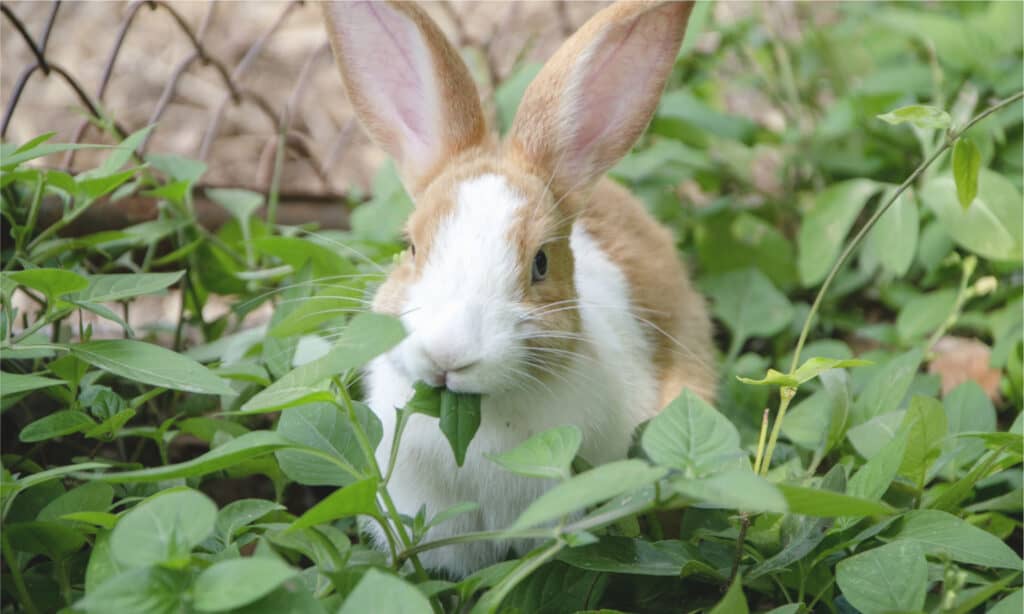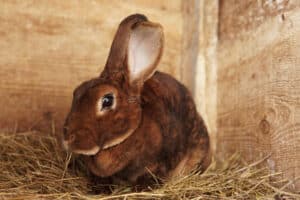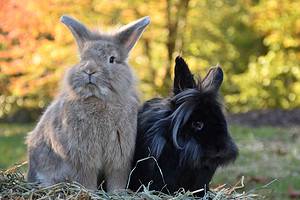There are a lot of common misconceptions when it comes to a safe and healthy diet for pet rabbits. Many pet owners simply aren’t sure what vegetables, fruits, and greens are safe for their beloved pets and don’t know where to ask these important questions. Fortunately, we’ve got the answers you need here. If you’ve ever wondered whether or not your rabbit can safely eat potatoes and whether they should be raw or cooked, read on. We’ll also touch on some other vegetables to avoid and what your rabbit should be eating instead.
Can Rabbits Eat Potatoes? Why or Why Not?

The bulk of your rabbit’s diet (90%+) should ideally consist of fresh hay, grasses, and dark, leafy greens.
©stopovers/Shutterstock.com
In general, no, your rabbit should never eat potatoes, regardless of whether they are raw or cooked. For starters, potatoes are very high in calories, carbohydrates, and starch. All of these can cause weight gain and digestive upset for your rabbit. Additionally, potatoes lack the fiber rabbits need in their diet to support their digestion.
Your rabbit’s diet needs to be primarily made up of (at least 80%) fresh hay, grasses, and fresh water. In addition to fresh grasses and hay, rabbits should eat a decent amount of fresh, dark, leafy greens (around 10% to 15% of their dietary intake). A small amount of commercial pellet food is also optional. Finally, a small amount of safe “treats” for your rabbit (less than 5% or so of their dietary intake), such as bananas and grapes (cut into smaller pieces to prevent choking), is acceptable.
Notably, rabbits are grazers, and their digestive systems are always moving at a rather speedy pace. Plus, their teeth grow continuously. This means they need to eat large amounts of fibrous greens and hay frequently to help file down their teeth.
It’s also worth noting that rabbits are unable to vomit, so you should avoid feeding them anything that could upset their stomachs or interfere with the digestion process. This is in part due to the positioning of their stomachs, as well as the fact that they lack a gag reflex. Their gastric muscles are also too weak to allow them to vomit.
What Other Vegetables Should Rabbits Not Eat?
While we’re on the subject, it’s worth addressing some other vegetables you should avoid feeding to your rabbit. Here are the most notable varieties, as well as the main reasons why you should withhold feeding them to your bunny pal.
- Light-colored lettuce: Like iceberg and romaine, these lettuces lack nutritional value and mostly consist of water.
- Onions: As well as anything in the onion family, such as chives. These are toxic to rabbits.
- Avocado: Although they’re technically a fruit, they’re definitely worth mentioning here. Avocados are very fatty, and they contain persin, which is toxic to rabbits and many other pets.
- Rhubarb: Rhubarb is high in oxalates, or oxalic acid. This interferes with the absorption of calcium, which can be damaging to your rabbit’s digestive system.
- Legumes: Most beans are high in carbohydrates and can cause gastrointestinal issues and upset stomachs. (Notably, however, green beans are safe as treats.)
- Corn: Similarly, corn is difficult for rabbits to digest.
- Seeds: Avoid any and all vegetable seeds, as these can cause serious digestive problems.
- Broccoli: This can also be difficult to digest and cause excessive gas and bloating.
The photo featured at the top of this post is © photoPOU/Shutterstock.com
Thank you for reading! Have some feedback for us? Contact the AZ Animals editorial team.







